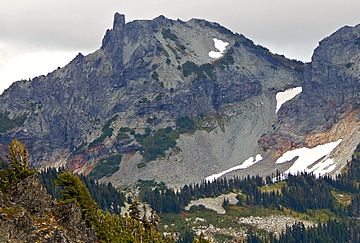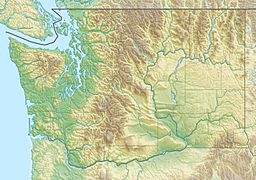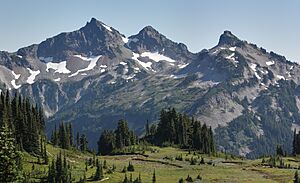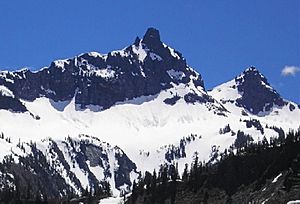Unicorn Peak facts for kids
Quick facts for kids Unicorn Peak |
|
|---|---|
 |
|
| Highest point | |
| Elevation | 6,971 ft (2,125 m) |
| Prominence | 2,091 ft (637 m) |
| Geography | |
| Location | Mount Rainier National Park Lewis County, Washington, U.S. |
| Parent range | Tatoosh Range, Cascades |
| Topo map | USGS Tatoosh Lakes |
| Climbing | |
| Easiest route | Climbing |
Unicorn Peak is the highest point in the Tatoosh Range. This mountain range is a smaller part of the huge Cascade Range. Unicorn Peak is located inside Mount Rainier National Park. It sits just south of the famous Mount Rainier. The mountain's name comes from its shape. It looks like the head and horn of a unicorn. The U.S. Board on Geographic Names officially gave it this name in 1913. Water from the mountain's small glaciers, like Unicorn Glacier, flows into streams. These streams then join the Cowlitz River.
Contents
Understanding Unicorn Peak's Climate
Unicorn Peak is located in a special climate zone. This zone is called the marine west coast climate. It means the area gets a lot of moisture from the Pacific Ocean. Most weather systems start over the Pacific Ocean. They then travel northeast towards the Cascade Mountains.
How Weather Forms on the Cascades
As these weather systems reach the Cascade Mountains, they are forced upwards. This process is called orographic lift. When the air rises, it cools down. This cooling makes the moisture in the air turn into rain or snow. Because of this, the western side of the Cascade Mountains gets a lot of rain and snow. This is especially true during the winter months.
Temperatures and Seasons
Due to its mild climate and closeness to the Pacific Ocean, temperatures here are usually not extreme. It rarely gets colder than 0 °F (−18 °C) (which is -18°C). It also rarely gets hotter than 80 °F (27 °C) (which is 27°C). During winter, the weather is often cloudy. But in summer, high pressure systems over the Pacific Ocean bring clear skies. This means there is often little or no cloud cover.
Snow and Safety
Because of the ocean's influence, the snow tends to be wet and heavy. This type of snow can increase the danger of avalanches. It is important to be aware of snow conditions when visiting.
- Weather forecast: Unicorn Peak
- National Park Service web site: Mount Rainier National Park
 | Jewel Prestage |
 | Ella Baker |
 | Fannie Lou Hamer |




